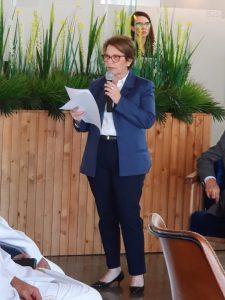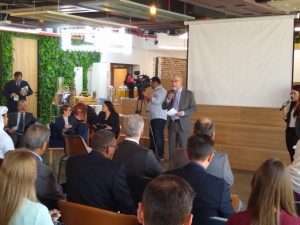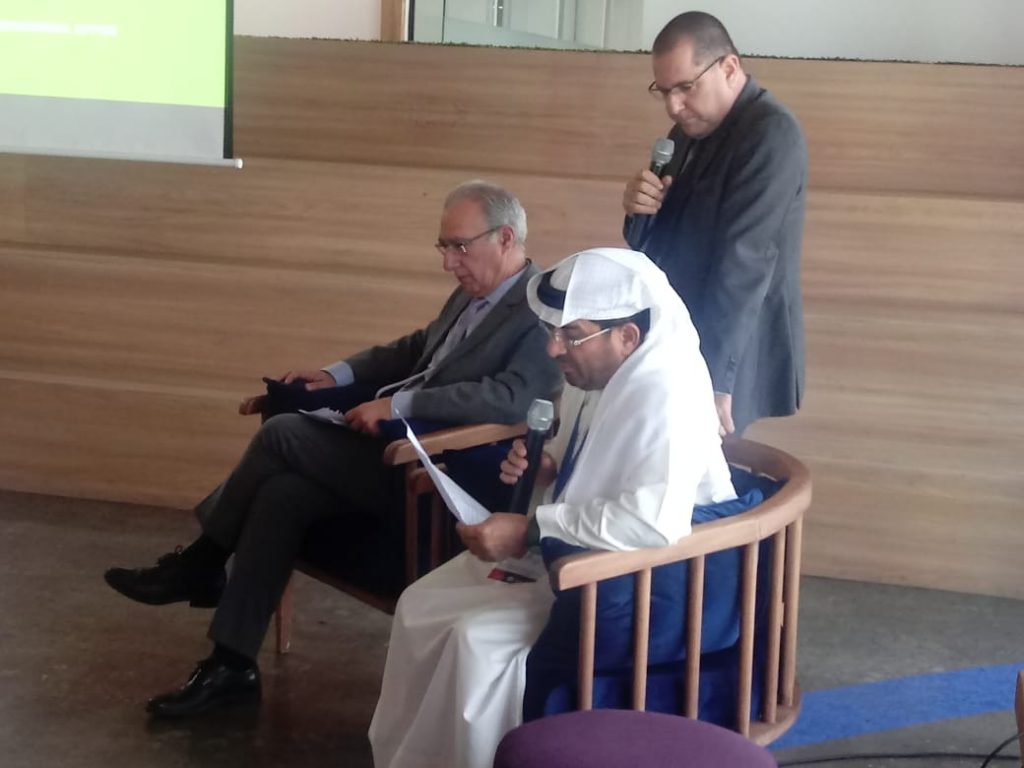Dubai – The Arab Authority for Agricultural Investment and Development (AAAID) wants to invest in poultry production in Sudan with a Brazilian partner company. That was what the company’s chairman and CEO Mohammed Obaid Almazrooei (pictured above) told ANBA this Sunday (22) during a seminar that brought together Emirati and Brazilian businesspeople at the Arab Brazilian Chamber of Commerce international office in Dubai. The seminar featured Brazil’s ministry of Agriculture, Livestock and Supply, Tereza Cristina, who leads the Brazilian mission to four Arab countries.

AAAID is a financial institution comprising 21 Arab countries with a USD 1.1 billion capital aimed at investing in foodstuff companies producing in the Arab world, thus contributing to local food security. The company’s statute determines that it can only have a share of companies based in the Arab countries, but in turn they may have production projects abroad, Almazrooei reported. The company has shares in Agricultural and Livestock businesses.
Mentioning Sadia, which is part of Brazilian company BRF, which has a processing unit in the United Arab Emirates, Almazrooei said he wished more poultry companies operated in Arab countries. “Sudan has an adequate weather, similar to Brazil, and consumer culture has changed, so producing in loco makes the consumption easier,” he told ANBA. The executive wants to establish a poultry production project in Sudan, which is an Arab country, together with a Brazilian company. Almazrooei said he had even discussed investment with Brazilians three years ago, but nothing happened.
During the seminar, the executive presented figures showing how the projects the company invests in contribute to the food supply in each Arab country. In the UAE, its poultry share is 33%, in Saudi Arabia 9%, in Sudan 5% and in Oman 28%. In sugar, in Sudan it’s 50% and Egypt 8%. In the UAE dairy market, the companies AAAID has shares in own 33% and, in Tunisian ones 8%. In vegetable oils in Syria, projects with the company’s capital account for 12% of the market and, in Sudan, 13%. It has shares in 50 companies in Arab countries, being 39 already in place and the others being implemented.
At the same event, Brazilian minister of Agriculture manifested Brazil’s interest in receiving Arab investment, especially in agribusiness and production outflow logistics. “Seeing that the UAE are a great world investor and Brazil has been one of the main destinations of foreign investment, I see a huge room for us to work together,” she said. She pointed out that Brazil and the UAE signed a Cooperation and Facilitation Investment Agreement (CFIA) to encourage, simplify and support bilateral investment.

Arab Chamber president Rubens Hannun addressed the growing UAE-Brazil trade in the seminar. As per data he showed, Brazil exports to the country climbed by 20.4% year-to-date through July, while UAE exports to the Brazilian market were up 168%. But he believes there’s room for more, new types of products and to involve more companies in this trade, as much as this has happened. “We thank this mission led by the minister. We know it will make business grow even more, coupled with the trip to Arab countries Brazil’s president Jair Bolsonaro will make next October,” he said.
The seminar featured around 90 people and it was the first event the Arab Chamber held in its international office auditorium in Dubai. The event also featured representatives of other Brazilian and Arab organizations, such as Brazilian Confederation of Agriculture and Livestock (CNA), Sugar Cane Industry Association, Brazilian Trade and Investment Promotion Agency (Apex-Brasil) and the Arab Chamber international office. Brazilian authorities included congressman Alceu Moreira (MDB), Brazil’s ambassador to Abu Dhabi, Fernando Igreja, and Ministry of Agriculture Foreign Relations and Trade secretary Orlando Leite Ribeiro.
The seminar was part of the activities the minister of Agriculture is leading to four Arab countries. Tereza Cristina’s appointments end this Sunday in the United Arab Emirates, after having been to Egypt, Saudi Arabi and Kuwait. The delegation featured Brazilian organizations and companies.
Translated by Guilherme Miranda




